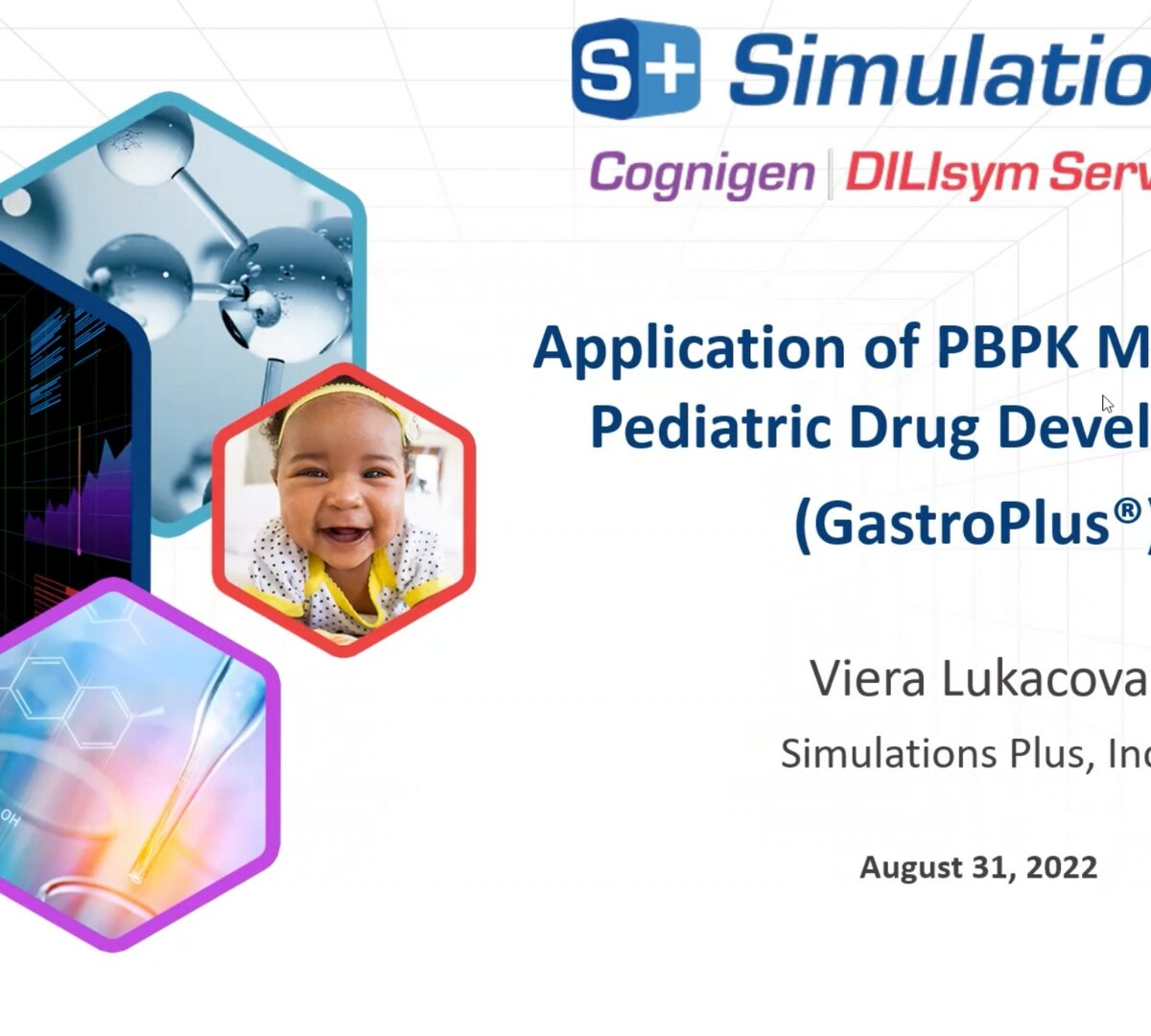Dr. Brian P. Booth and Dr. Hao Zhu from the Office of Clinical Pharmacology (OCP) at the FDA will present and discuss Project Optimus, an initiative from the Oncology Center of Excellence (OCE) to reform the dose optimization and dose selection paradigm in oncology drug development.

Application of PBPK Modeling in Pediatric Drug Development (GastroPlus®)
Role of PBPK in Pediatric Drug Development

Next Gen Tech for QST/QSP & PBPK Modeling
Simulations Plus is excited to share some technical advances that have been made to two of the feature models developed by the DILIsym Services division!

Predicting PK of Multisource Acyclovir Oral Products Through PBBM Modeling
Highly variable disposition after oral ingestion of acyclovir has been reported, although little is known regarding the underlying mechanisms.

Using PBPK modeling to assess the impact of diseases on oral drug absorption: case study in HIV-infected patients
Randomized clinical trial is the most effective way to determine whether a cause-and-effect relationship exists between an intervention and a predefined clinical outcome.

ADMET Predictor® 10.4 (APX.4) Release Webinar
Eric Jamois, Director of Business Development, will host a webinar on Wednesday, May 18th to introduce the new ADMET Predictor® 10.4 (APX.4) flagship machine learning platform for ADMET modeling, with extended capabilities for data analysis, metabolism prediction, and AI-driven drug design. David Miller, VP of ADMET Cheminformatics will show some of the new features in APX.4.

Active Learning in a Pandemic: Teaching Biopharmaceutics with GastroPlus®
This webinar will showcase the use of GastroPlus® for a pharmacy course.

Membrane Plus v3 Release Webinar
Learn about new, improved, and enhanced features to drive advances to in vitro-in vivo extrapolation (IVIVE) for permeability, hepatocyte, skin penetration, and release assay systems.

Introducing ILDsym, a New Tool to Facilitate Development of Drugs to Treat Interstitial Lung Disease
Systemic sclerosis (SSc), also known as scleroderma, is a rare connective tissue and autoimmune disease associated with inflammation and fibrosis of the skin and/or internal organs.

Applying Mechanistic Modeling to Predict Food Effects on Drugs: Approaches and Special Considerations
The focus of this webinar will be to discuss how physiological differences between fasted and fed states have been incorporated into mechanistic absorption (MAM) and physiologically based pharmacokinetic (PBPK) models to predict positive and negative food effects.

Exploratory Study on Lercanidipine Hydrochloride Polymorphism: pH-Dependent Solubility Behavior
Based on the recent publication from AAPS PharmSci Tech, this 60-minute webinar will showcase an example of the use of GastroPlus® to assess the risk and pharmacokinetic relevance of different solubility and particle size between crystal forms of a poorly water-soluble antihypertensive drug, for diverse physiological conditions.

Using PBPK M&S to support the development of an IR tablet formulation & setting more relevant dissolution test specifications
Development of formulation and setting dissolution test specifications for IR tablets based on PBPK modeling & simulation – amiodarone as a case example

Application of PBPK modeling & simulation to support dose selection in special populations – Bilastine as a case example
Dose recommendations are usually established using data driven approaches, i.e., population modeling & simulation...

PBPK Modeling of Pulmonary Drug Absorption: Challenges & Perspective
PBPK models that describe drug performance following pulmonary administration, like the PCAT™ model within GastroPlus(R), have appeared more recently, yet few pieces of literature report on their use.

What’s New in GastroPlus v9.8.2?
The latest version of GastroPlus® has the most innovative & integrative software improvements to accelerate drug development through continued collaborations with several large pharmaceutical companies and the U.S. FDA!

What’s new in MonolixSuite 2021
Watch out for the release of MonolixSuite 2021!

PBPK Modeling Approach in Pregnant Subjects and Fetus
PBPK modeling gives birth to a new application!

Developing a PBPK modeling approach for evaluating drug product performance in infants based on adults data
Understanding drug and drug formulation performance in relation to the prandial conditions is essential for ensuring the safety and efficacy of products to be administered to pediatric patients, especially newborns...

ADMET Predictor® 10.3 (APX.3): Flagship machine learning platform for ADMET modeling
Panelist David Miller, VP of ADMET Cheminformatics will show some of the new features in APX.3, including details about a new REST API for deployment via Web services.

Real-world Considerations in Pharma for QSP Modeling
Quantitative systems pharmacology (QSP) modeling enables better drug development decisions through a more advanced understanding of the disease area of inter

